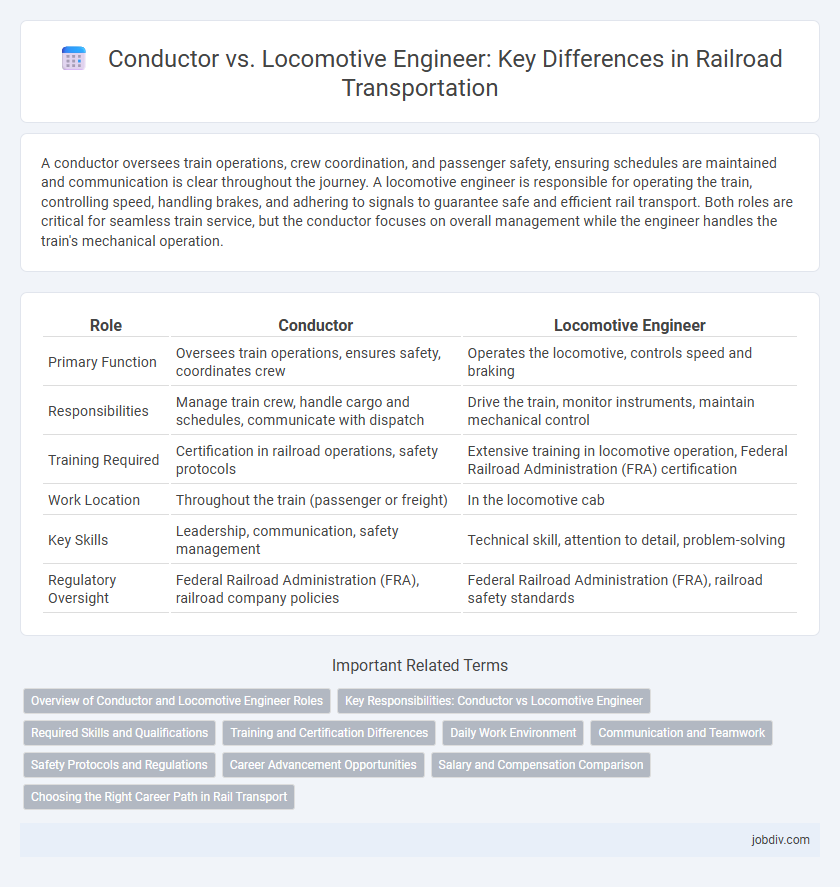A conductor oversees train operations, crew coordination, and passenger safety, ensuring schedules are maintained and communication is clear throughout the journey. A locomotive engineer is responsible for operating the train, controlling speed, handling brakes, and adhering to signals to guarantee safe and efficient rail transport. Both roles are critical for seamless train service, but the conductor focuses on overall management while the engineer handles the train's mechanical operation.
Table of Comparison
| Role | Conductor | Locomotive Engineer |
|---|---|---|
| Primary Function | Oversees train operations, ensures safety, coordinates crew | Operates the locomotive, controls speed and braking |
| Responsibilities | Manage train crew, handle cargo and schedules, communicate with dispatch | Drive the train, monitor instruments, maintain mechanical control |
| Training Required | Certification in railroad operations, safety protocols | Extensive training in locomotive operation, Federal Railroad Administration (FRA) certification |
| Work Location | Throughout the train (passenger or freight) | In the locomotive cab |
| Key Skills | Leadership, communication, safety management | Technical skill, attention to detail, problem-solving |
| Regulatory Oversight | Federal Railroad Administration (FRA), railroad company policies | Federal Railroad Administration (FRA), railroad safety standards |
Overview of Conductor and Locomotive Engineer Roles
Conductors manage train operations by coordinating crew activities, overseeing cargo or passenger safety, and ensuring compliance with schedules and regulations. Locomotive engineers operate the train's engine, controlling speed, brakes, and monitoring mechanical performance to maintain safe and efficient travel. Both roles require specialized training and certification, with conductors focusing on operational logistics and engineers on technical handling of the locomotive.
Key Responsibilities: Conductor vs Locomotive Engineer
Conductors are primarily responsible for managing train operations, ensuring passenger safety, coordinating crew activities, and communicating with dispatchers to maintain schedules. Locomotive engineers operate the train's engine, controlling speed, braking, and adherence to signals to ensure safe and efficient travel. Both roles require extensive knowledge of rail safety protocols, but conductors focus on overall train management while engineers specialize in locomotive control.
Required Skills and Qualifications
Conductors require strong communication, organizational skills, and knowledge of safety regulations to manage train operations and passenger interactions effectively. Locomotive engineers must possess in-depth technical expertise, excellent spatial awareness, and precise control skills to operate and navigate trains safely. Both roles necessitate certification from the Federal Railroad Administration (FRA) and completion of specialized training programs.
Training and Certification Differences
Conductors undergo training that emphasizes safety protocols, communication skills, and operational coordination, culminating in certification from the Federal Railroad Administration (FRA). Locomotive engineers receive intensive hands-on instruction in train handling, mechanical systems, and regulatory compliance, requiring passing a rigorous FRA certification exam. Both roles demand continuous education to maintain certification, but engineers face more stringent testing due to the technical complexity of train operation.
Daily Work Environment
Conductors coordinate train operations by managing passenger safety, ticketing, and communication with dispatchers while working primarily on the train cars. Locomotive engineers operate the train's engine, controlling speed, braking, and adherence to signals from the locomotive cab or control room. Both roles require vigilance in varying weather conditions and constant communication to ensure safe and timely train movement.
Communication and Teamwork
Effective communication and teamwork are crucial between conductors and locomotive engineers to ensure safe and efficient train operations. Conductors coordinate with engineers by relaying track conditions, signals, and schedule changes while engineers provide real-time feedback on locomotive performance and track status. Their collaboration minimizes errors, enhances on-time arrivals, and maintains passenger and cargo safety throughout the journey.
Safety Protocols and Regulations
Conductors and locomotive engineers follow strict safety protocols regulated by the Federal Railroad Administration (FRA) to ensure operational safety. Conductors manage train crew coordination and enforce compliance with communication and hazard identification procedures, while locomotive engineers are responsible for operating the train within speed limits and adhering to signaling regulations. Both roles require rigorous training on emergency response, track safety standards, and the use of safety technologies like Positive Train Control (PTC).
Career Advancement Opportunities
Career advancement opportunities for conductors typically involve progressing to roles such as yardmaster, trainmaster, or moving into management positions within railroad operations. Locomotive engineers can advance by gaining certifications to operate more complex or higher-speed trains, transitioning into training positions, or assuming supervisory roles like chief engineer. Both career paths offer specialized skill development, enabling professionals to leverage experience for leadership positions in the rail transportation industry.
Salary and Compensation Comparison
Locomotive engineers typically earn higher salaries than conductors, with the median annual wage of engineers around $70,000 compared to $60,000 for conductors, according to the U.S. Bureau of Labor Statistics. Engineers receive additional compensation through overtime pay and bonuses tied to performance and safety standards. Conductors earn competitive benefits and may receive hazard pay or travel stipends, but overall, locomotive engineers experience greater total compensation due to higher base wages and opportunities for premium pay.
Choosing the Right Career Path in Rail Transport
Choosing a career as a conductor or locomotive engineer in rail transport depends on your preference for operational responsibilities or train control. Conductors manage train crew coordination, safety protocols, and customer interactions, while locomotive engineers focus on operating the train and maintaining speed, braking, and mechanical systems. Evaluating work environment, required certifications like the Federal Railroad Administration (FRA) licenses, and physical demands helps in selecting the right career path.
Conductor vs Locomotive Engineer Infographic

 jobdiv.com
jobdiv.com